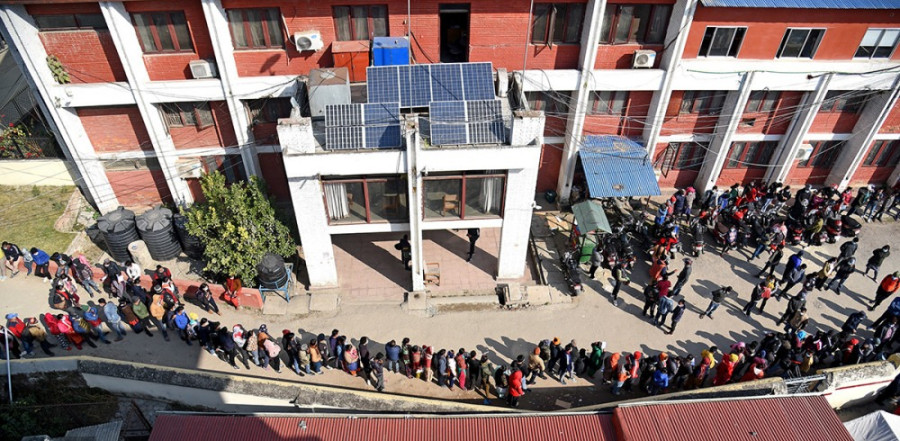Editorial
Queues and chaos
Every wave seems to expose our lack of preparedness, always leaving things to be done at the eleventh hour.
With the virus spreading like wildfire, the authorities now seem to have woken up from the slumber. Nearly two months after Omicron was first reported to the World Health Organisation by the South African administration, the decision-makers in Nepal showed some concerns. Still, barely anything noticeable on the ground corroborated their concerns. The political parties hosted a series of general conventions that attracted multitudes. The attitude of the politicians did not in the least reflect the concerns of a country’s situation in the middle of the pandemic. Not a single politician gave a word of caution to the crowds of people that made their way to the jam-packed jamborees.
Within a couple of days, decision-makers resorted to closing schools and restricting the gatherings to a maximum of 25 people. The government has come down with a slew of measures disseminated at a rate that is becoming difficult for the average person to absorb. One of the measures currently causing concern for people and the airline industry is the necessity for air passengers to carry a vaccination card to board flights.
It may be true that the need for a vaccination card has hastened the cause for more people to get vaccinated. So why didn’t the authorities come up with this measure when the number of cases was negligible? A knee-jerk reaction has the unfortunate effect of attracting crowds of people queuing close and increasing the chance of spreading the virus. An opposite effect to the one intended by the authorities. And only if the process is as seamless as it is often shown. There were no clear directives concerning the location for booster vaccines, and people had to put up with the frustration of queuing up for hours only to be told that the quota for the day was over.
Mismanagement is rife, and amidst this chaos, the added burden of carrying a vaccination card to access public service for the greater good is a bit ironic. And this has come a little too late and a little too slow. While the authorities have a point in saying that stern measures such as the necessity to carry vaccination cards are needed to push ahead with the vaccination drive, they certainly lack the higher moral ground to make such lofty statements.
When the nation was overflowing with vaccines, the authorities showed no urgency in seeking innovative measures to push for the vaccination. Now that we are in the middle of the third wave, there isn’t much progress except for statements showing a lack of planning and coordination. Poor disaster management and lack of execution skills are the two visible weaknesses in the system. If we are to go by the experience of the past two waves, everything indicates that we are in for the long haul. And every wave seems to expose our lack of preparedness in dealing with an emergency, always leaving things to be done at the eleventh hour.




 18.12°C Kathmandu
18.12°C Kathmandu














